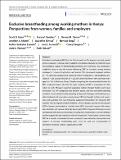Exclusive Breastfeeding among Working Mothers in Kenya: Perspectives from Women, Families and Employers
View/
Publication Date
2021-03-26Type
Article, Journalviews
downloads
Metadata
Show full item recordCitation
Ickes SB, Sanders H, Denno DM, Myhre JA, Kinyua J, Singa B, Lemein HS, Iannotti LL, Farquhar C, Walson JL, Nduati R. Exclusive breastfeeding among working mothers in Kenya: Perspectives from women, families and employers. Matern Child Nutr. 2021 Oct;17(4):e13194. doi: 10.1111/mcn.13194. Epub 2021 May 5. PMID: 33949782; PMCID: PMC8476403.
Abstract/
Exclusive breastfeeding (EBF) for the first 6 months of life improves survival, growth and development. In Kenya, recent legislation and policies advocate for maternity leave and workplace support for breastfeeding and breast milk expression. We conducted a qualitative study to describe factors influencing EBF for 6 months among mothers employed in commercial agriculture and tourism. We interviewed employed mothers (n = 42), alternate caregivers and employed mothers' husbands (n = 20), healthcare providers (n = 21), daycare directors (n = 22) and commercial flower farm and hotel managers (n = 16) in Naivasha, Kenya. Despite recognizing the recommended duration for EBF, employed mothers describe the early cessation of EBF in preparation for their return to work. Managers reported supporting mothers through flexible work hours and duties. Yet, few workplaces have lactation spaces, and most considered adjusting schedules more feasible than breastfeeding during work. Managers and healthcare providers believed milk expression could prolong EBF but thought mothers lack experience with pumping. The most frequently suggested interventions for improving EBF duration were to expand schedule flexibility (100% of groups), provide on-site daycare (80% of groups) and workplace lactation rooms (60% of groups), improve milk expression education and increase maternity leave length (60% of groups). Returning to work corresponds with numerous challenges including lack of proximate or on-site childcare and low support for and experience with milk expression. These factors currently make EBF for 6 months unattainable for most mothers in these industries. Interventions and supports to improve breastfeeding upon return to work are recommended to strengthen employed mothers' opportunity for EBF.
Subject/
Breastfeeding; Caregiving; Lactation; Low-income countries; Policy; Qualitative methods; Social factors
Further Details
This is an open access article under the terms of the Creative Commons Attribution License, which permits use, distribution and reproduction in any medium, provided the original work is properly cited.
Publisher
WILEYCollections
- General - GEN [367]

